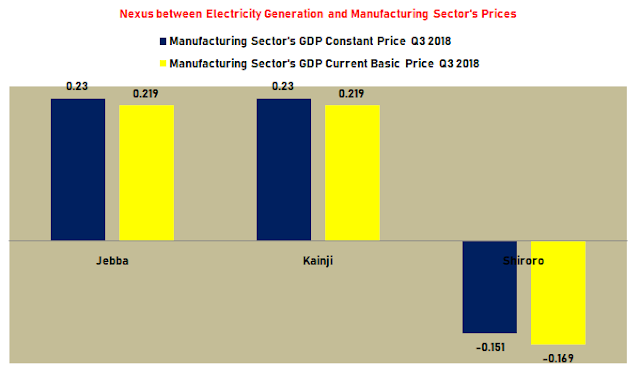How Electricity Generation from 3 Hydropower Stations Affected Nigerian Manufacturing Sector in Q3 2018
The Nigerian
manufacturing sector is the sector with the highest number of markets having a
number of companies, according to the National Bureau of Statistics. The
markets include oil Refining, Cement,
Food, Beverage and Tobacco, Textile, Apparel and Footwear, Wood and Wood
Products, Pulp, Paper and Paper Products, Chemical and Pharmaceutical Products,
Non-Metallic Products, Plastic and Rubber products, Electrical and Electronics,
Basic metal, Iron and Steel, Motor vehicles and assembly and others.
Like companies in other sectors and markets,
companies in manufacturing sector cannot be exonerated from various
challenges retarding their growth and contributions to economic growth.
Over the years, power has remained the critical problem affecting companies’
productivity and revenue generation. A recent report from the country’s bureau
of statistics indicates that “the power
generation statistics for Q3 2018 reflected that a total average of 78,917 MWh
of energy was generated daily by power stations. Daily energy generation
attained a peak of 90,197 MWh on the 16th of August 2018. Thermal stations
generated a peak of 85,948 MWh on 10th July, 2018 while the hydro stations
attained a peak of 30,164 MWh on the 28th of August, 2018.”
The report further
notes that the lowest daily energy generation of 57,357 MWh was attained on 8th
of July 2018. These were the situations in Q3 2018 in which manufacturing companies
were expected to utilise their means of production towards economic growth
during the period. Infoprations
expands the insights further through an analysis of the electricity generated
from three hydropower stations –Jebba, Kainji and Shiroro. Initial analysis
reveals that electricity consumption connected with the constant and current
basic prices of the manufacturing sector by 22.3% and 21.3% respectively. When the prices were analysed along with the
three stations, results show that constant and current basic prices of the
sector connected with the Shiroro station negatively. Positive connection was
recorded for Jebba and Kainji stations.
These insights indicate
that Nigerian government needs to intensify its efforts towards adequate power
generation from the three stations, especially Shiroro station. This is
imperative for the sector to make significant contributions to the economic
growth every quarter.

Comments
Post a Comment